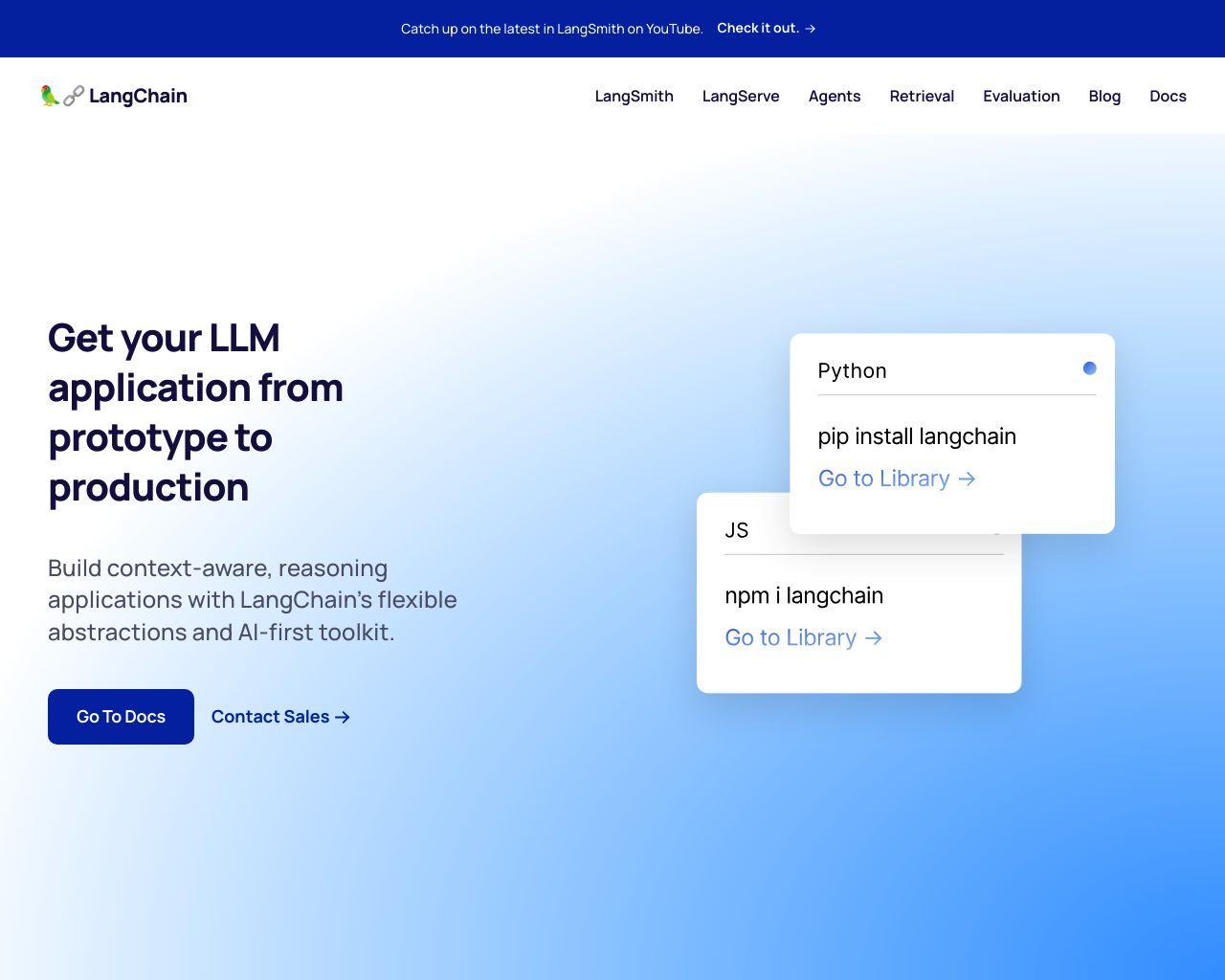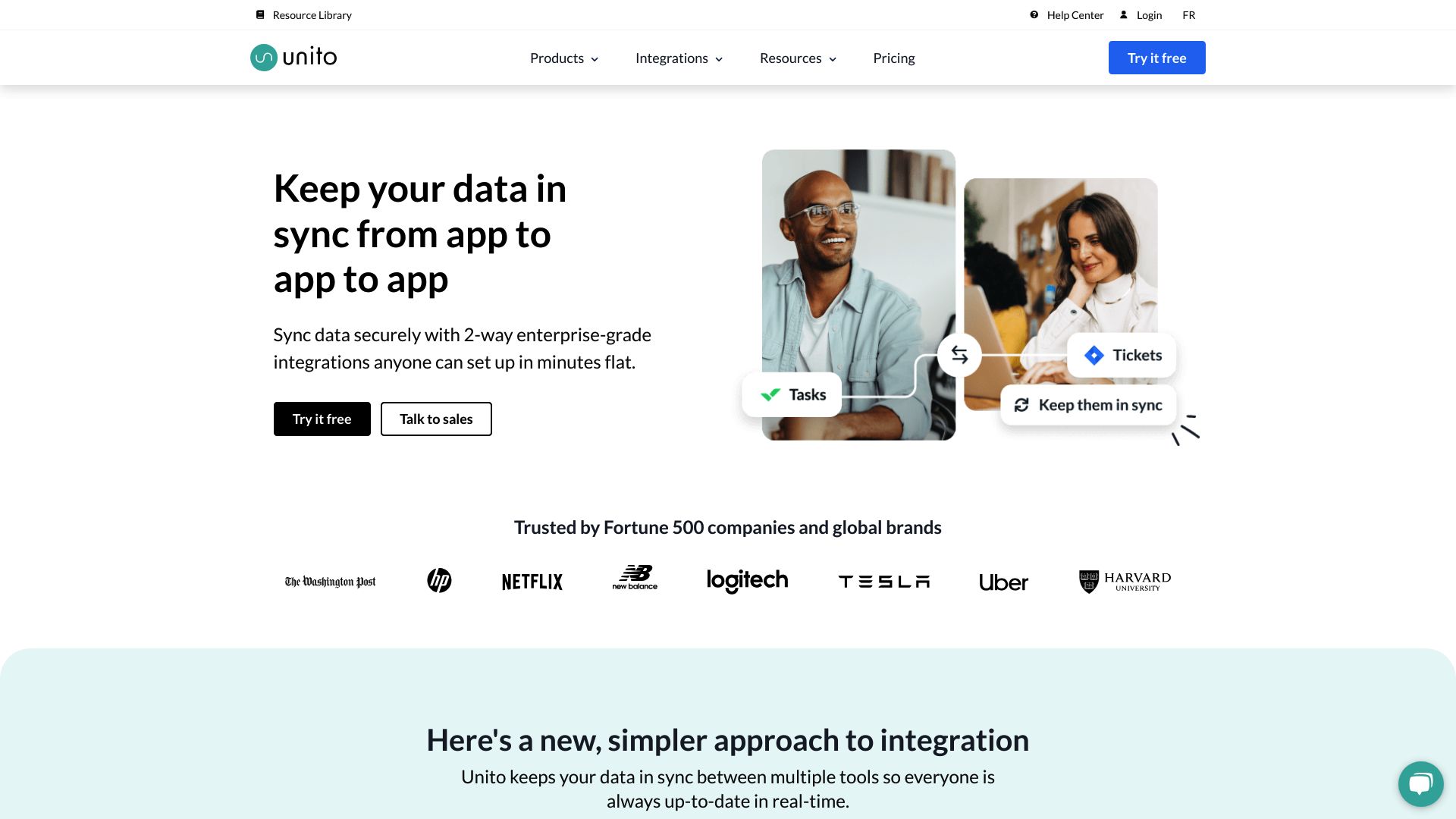LangChain vs. Unito: AI Development or Workflow Integration?
AI-powered solutions are reshaping industries, empowering businesses to unlock unprecedented levels of efficiency and innovation. As developers, business leaders, and AI enthusiasts seek the right tools to harness this transformative technology, three platforms stand out: LangChain vs. Unito, and SmythOS. This comparison delves into their unique strengths, exploring how each tackles the challenges of AI integration, workflow automation, and application development.
We’ll examine LangChain’s prowess in AI development, Unito’s expertise in workflow synchronization, and SmythOS’s comprehensive approach that bridges both worlds. Whether you’re a seasoned developer looking to build sophisticated AI applications or a business leader aiming to streamline operations, this analysis will guide you through the key features, use cases, and potential limitations of each platform, helping you make an informed decision in your AI journey.
LangChain Overview
LangChain revolutionizes AI application development with its comprehensive open-source framework. This platform empowers developers to create sophisticated applications powered by large language models (LLMs), streamlining every phase of the LLM application lifecycle.
At its core, LangChain offers a suite of tools designed for building, testing, and deploying LLM-driven solutions. The framework’s modular architecture includes LangGraph for creating stateful, multi-actor applications, and LangSmith for rigorous debugging and monitoring. LangChain’s Expression Language (LCEL) enables declarative component chaining, optimizing performance through features like parallel execution and streaming support.
LangChain revolutionizes AI application development with its comprehensive open-source framework… empowers developers to create sophisticated applications powered by large language models (LLMs)…
LangChain excels in its flexibility and integration capabilities. The platform supports various foundational AI models and offers extensive third-party integrations, allowing developers to leverage tools like OpenAI and Anthropic seamlessly. This versatility makes LangChain an ideal choice for diverse applications, from chatbots and question-answering systems to complex autonomous agents.


While LangChain provides robust tools for AI development, it requires a certain level of technical expertise. The platform caters primarily to developers and data scientists, potentially presenting a steeper learning curve for non-technical users. Additionally, as an open-source framework, LangChain may require more setup and configuration compared to fully managed solutions.
LangChain’s ecosystem continues to evolve rapidly, driven by a vibrant community of contributors. This collaborative environment fosters innovation but may also lead to occasional instability or compatibility issues as new features are introduced. Users should stay informed about updates and be prepared to adapt their implementations accordingly.
Unito Overview
Unito revolutionizes workflow integration with its powerful Sync Platform. This innovative solution seamlessly connects disparate tools, breaking down silos and enhancing collaboration across teams.


Unito’s real-time two-way sync technology forms the core of its offering, ensuring data consistency across connected applications. The platform excels in deep field configuration, allowing users to customize syncing parameters to match their specific workflow needs. Historical sync capabilities integrate past data, providing comprehensive project insights.
Unito’s real-time two-way sync technology forms the core of its offering, ensuring data consistency across connected applications.
The platform boasts an impressive array of connectors for industry-leading tools like Asana, Jira, Trello, and GitHub. Unito’s commitment to security is evident in its SOC II Type 2 certification, addressing enterprise-level concerns. The self-serve setup empowers users to configure and initiate integrations independently, reducing reliance on IT departments.
While Unito offers robust integration capabilities, it lacks some features common in AI agent builders. The platform doesn’t provide a visual builder or no-code editor for creating AI agents. Additionally, it doesn’t support autonomous agents or offer multimodal capabilities. These limitations may impact users seeking comprehensive AI development tools within their integration platform.
Feature Comparison
LangChain and Unito offer distinct capabilities in different domains of software development and workflow integration. LangChain excels in AI development, providing tools for building sophisticated language model applications. It supports the creation of AI agents, offers debugging and monitoring capabilities through LangSmith, and enables deployment of LLM-powered applications. LangChain’s LangGraph facilitates multi-agent systems and complex AI workflows.
Unito, on the other hand, specializes in workflow integration across various tools and platforms. Its strength lies in real-time two-way synchronization, allowing seamless data flow between different applications. Unito offers deep field configuration for customized syncing and supports historical data integration. While Unito provides robust integration capabilities, it lacks features specific to AI agent development, such as autonomous agents or multimodal capabilities.
In terms of security, both platforms prioritize data protection, with LangChain emphasizing best practices and Unito boasting SOC II Type 2 certification. However, LangChain’s focus on AI development means it offers more specialized features for constrained alignment and explainable AI, which are crucial for responsible AI deployment. Unito’s security measures are more geared towards ensuring safe data transfer between integrated tools.
Feature Comparison Table
| LangChain | Unito | SmythOS | |
|---|---|---|---|
| CORE FEATURES | |||
| Visual Builder | ❌ | ✅ | ✅ |
| No-Code Options | ❌ | ✅ | ✅ |
| Autonomous Agents | ✅ | ❌ | ✅ |
| Multimodal | ✅ | ❌ | ✅ |
| Human-AI Interaction | ✅ | ❌ | ✅ |
| Agent Work Scheduler | ❌ | ❌ | ✅ |
| SECURITY | |||
| Constrained Alignment | ❌ | ✅ | ✅ |
| IP Control | ❌ | ❌ | ✅ |
| COMPONENTS | |||
| Foundation AIs | ✅ | ❌ | ✅ |
| Huggingface AIs | ✅ | ❌ | ✅ |
| Zapier APIs | ❌ | ✅ | ✅ |
| Classifiers | ✅ | ❌ | ✅ |
| Logic | ✅ | ✅ | |
| Data Lakes | ❌ | ❌ | ✅ |
| DEPLOYMENT OPTIONS (EMBODIMENTS) | |||
| Deploy as Webhook | ❌ | ❌ | ✅ |
| Staging Domains | ❌ | ❌ | ✅ |
| Production Domains | ❌ | ✅ | ✅ |
| Deploy as Site Chat | ✅ | ❌ | ✅ |
| Deploy as Scheduled Agent | ❌ | ❌ | ✅ |
| Deploy as GPT | ✅ | ❌ | ✅ |
| DATA LAKE SUPPORT | |||
| Hosted Vector Database | ❌ | ❌ | ✅ |
| Sitemap Crawler | ❌ | ❌ | ✅ |
| YouTube Transcript Crawler | ❌ | ❌ | ✅ |
| URL Crawler | ❌ | ❌ | ✅ |
| PDF Support | ✅ | ❌ | ✅ |
| Word File Support | ❌ | ❌ | ✅ |
| TXT File Support | ✅ | ❌ | ✅ |
Best Alternative to LangChain and Unito
SmythOS stands out as the superior alternative to LangChain and Unito, offering a comprehensive platform for AI agent development and deployment. We combine the best of both worlds — LangChain’s AI capabilities and Unito’s integration prowess — while providing additional features that set us apart.
Our visual builder and no-code options make AI agent creation accessible to users of all skill levels, democratizing AI development in a way that LangChain’s more technical approach does not. Unlike Unito, which focuses primarily on workflow integration, SmythOS enables the creation of autonomous, multimodal AI agents capable of complex problem-solving and human-AI interaction.
SmythOS enables the creation of autonomous, multimodal AI agents capable of complex problem-solving and human-AI interaction.
We offer unparalleled flexibility in deployment options. Users can deploy their AI agents as APIs, webhooks, site chats, scheduled tasks, or even as GPTs. This versatility surpasses both LangChain and Unito, allowing for seamless integration into various business processes and applications.
Our platform boasts advanced security features, including constrained alignment and IP control, ensuring that AI agents operate within defined parameters and adhere to organizational policies. While Unito offers some security measures, SmythOS provides a more comprehensive approach to data protection and ethical AI practices.
Unlike our competitors, SmythOS includes a hosted vector database and supports a wide range of data sources, including sitemaps, YouTube transcripts, and various file formats. This extensive data lake support enables the creation of more sophisticated and context-aware AI agents, capable of handling diverse information streams efficiently.
Conclusion
LangChain, Unito, and SmythOS each offer unique strengths in their respective domains. LangChain excels in AI development, providing powerful tools for building sophisticated language model applications. Unito shines in workflow integration, offering seamless synchronization between various business tools. However, SmythOS emerges as the comprehensive solution that combines the best of both worlds while offering additional features.
SmythOS stands out with its intuitive drag-and-drop interface, making AI agent creation accessible to both technical and non-technical users. Unlike LangChain, which requires programming expertise, SmythOS democratizes AI development. While Unito focuses on tool integration, SmythOS goes further by enabling the creation and deployment of AI agents across multiple platforms, including chatbots, APIs, and scheduled tasks.
The extensive integration ecosystem of SmythOS, supporting over 300,000 integrations, surpasses both LangChain and Unito in versatility. This allows users to connect various data sources, APIs, and AI models seamlessly. SmythOS also offers superior deployment options, enabling users to deploy their AI solutions across popular platforms like Google Vertex, Microsoft Copilot, and Amazon Web Services Bedrock.
For those looking to harness the power of AI in their workflows, SmythOS provides an unparalleled combination of ease of use, flexibility, and advanced features. We invite you to explore our diverse range of AI-powered agent templates and experience the future of AI development. Get started with SmythOS today and revolutionize your approach to AI integration and automation.
Last updated:
Disclaimer: The information presented in this article is for general informational purposes only and is provided as is. While we strive to keep the content up-to-date and accurate, we make no representations or warranties of any kind, express or implied, about the completeness, accuracy, reliability, suitability, or availability of the information contained in this article.
Any reliance you place on such information is strictly at your own risk. We reserve the right to make additions, deletions, or modifications to the contents of this article at any time without prior notice.
In no event will we be liable for any loss or damage including without limitation, indirect or consequential loss or damage, or any loss or damage whatsoever arising from loss of data, profits, or any other loss not specified herein arising out of, or in connection with, the use of this article.
Despite our best efforts, this article may contain oversights, errors, or omissions. If you notice any inaccuracies or have concerns about the content, please report them through our content feedback form. Your input helps us maintain the quality and reliability of our information.
